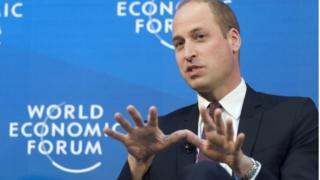Prince Williams says celebrities shunned mental health charity
 Image copyright
Image copyright
EPA
Prince William has said that every celebrity he asked to back his Heads Together mental health initiative three years ago refused.
The Duke of Cambridge said “a lot” of people were approached, but no one wanted to be associated with mental illness.
Speaking at the World Economic Forum, in Davos, he urged firms to help people open up on the issue.
Heads Together was launched to help combat the stigma of mental health.
It was started in 2017 with the backing of the Duke and Duchess of Cambridge, and Prince Harry.
The duke also spoke about his own struggles with mental health, saying there was one traumatic incident that he didn’t think he would “ever get over”.
He said if he hadn’t opened up to colleagues about the situation, he would have “gone down a slippery slope” mentally.
Looking visibly emotional, he said he still found the incident “very difficult to talk about” because it was “related very closely to my children”, George, Charlotte and Louis.
The prince has spoken previously about “very traumatic” callouts involving children while working for the air ambulance.
But he said such feelings were “only human”, adding: “Yes, you put a suit of armour on… but one day something comes along closely related to your own personal life and it really takes you over a line.”
Spotting the signs
The issue of mental health is a big theme at this year’s Davos, with several sessions on the topic.
Studies show one in four people will suffer from mental illness at some point in their life, but many people are still too embarrassed to admit they have a problem.
In the packed debate, the audience was asked whether they or anyone they knew had suffered from a mental illness. Nearly everyone in the room raised a hand.
HSBC boss John Flint, talking on the same panel, said that in the “notoriously competitive” banking industry mental health problems were common.
He said it was imperative that people at the top spoke about it to allow those lower down in the organisation to open up.
“We all sit on the spectrum [of mental health]. I know there’s a profound difference between when I’m feeling my best and when I’m not,” he added.
Mr Flint said the bank was training managers to spot signs of mental health problems so they could help staff deal with them.
He said it made business sense given the impact problems had on workers’ performance.


